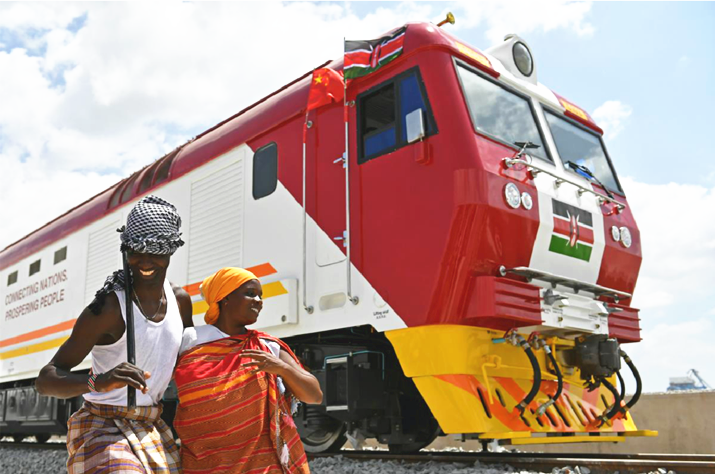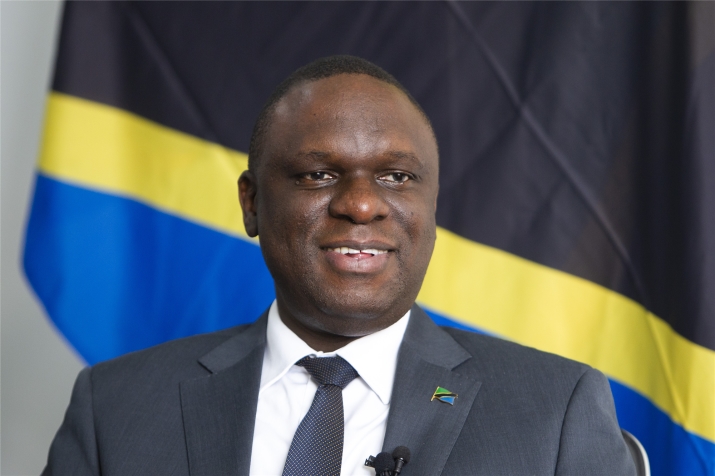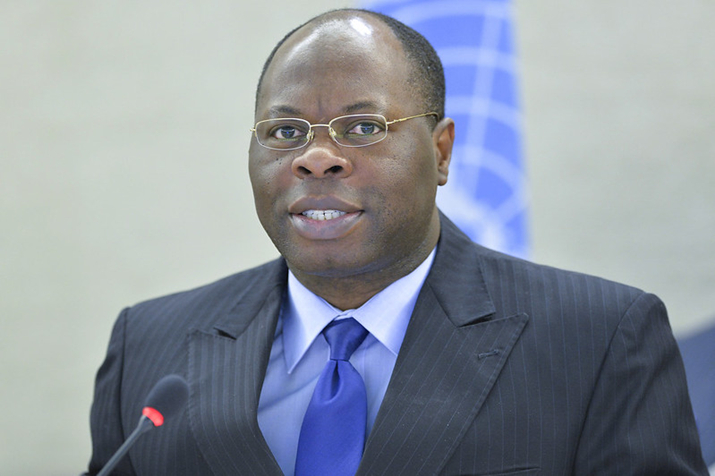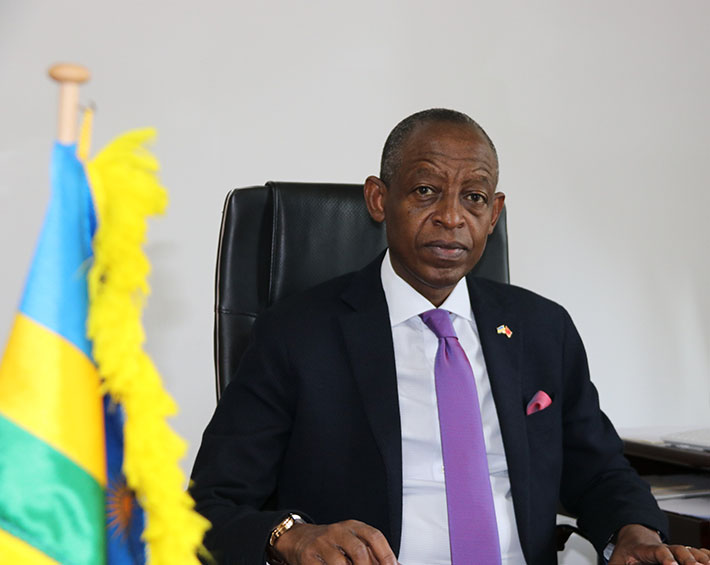|
||||||||||
| Home Nation World Business Opinion Lifestyle ChinAfrica Multimedia Columnists Documents Special Reports |
|
||||||||||
| Home Nation World Business Opinion Lifestyle ChinAfrica Multimedia Columnists Documents Special Reports |
| ChinAfrica |
| Chinese lending is pushing development of Africa, “debt trap” accusations groundless, say envoys |
| During the Two Sessions, ChinAfrica held a dialogue with African ambassadors to China to hear their comments on the significance of the BRI for the independent development of African countries |
| By Xia Yuanyuan 丨ChinAfrica Web Exclusive ·2023-03-10 |

Kenyans sing and dance beside one of the first batch of locomotives for the Mombasa-Nairobi standard gauge railway in Mombasa, Kenya, on 11 January, 2017
This year marks the 10th anniversary of the proposal of the Belt and Road Initiative (BRI). The progresses and achievements of the BRI have drawn plenty of attention from domestic and international media covering this year’s Two Sessions.
Africa is an important participant in the BRI. Fifty-two African countries as well as the African Union Commission have already signed cooperation agreements under the initiative. Over the past decade, under the framework of the BRI, a large number of projects have taken root and yielded fruitful results in African countries. However, Western media have accused that the BRI can cause so-called “debt traps” in Africa.
During the Two Sessions, ChinAfrica held a dialogue with African ambassadors to China to hear their comments on the significance of the BRI for the independent development of African countries, as well as their views on some of the criticism of the BRI and the so-called “debt trap” in Africa.

Mbelwa Kairuki, Tanzanian Ambassador to China
Open and voluntary by nature
Nyerere Bridge, Julius Nyerere International Airport Terminal III, Mtwara Natural Gas Thermal Power Plant and Transmission Lines Construction Project…
Tanzania has seen the launch of a large number of railway, highway, port, bridge and other projects since joining the BRI five years ago, and the bilateral trade volume between Tanzania and China has increased to more than $8 billion, Mbelwa Kairuki, Tanzanian ambassador to China, told ChinAfrica.
“I want to emphasise that agreements under the BRI framework are signed voluntarily based on mutual consultation. No one is forced to join the BRI,” he said.
He believes that spreading the denigration that China’s has created “debt traps” for African countries is actually equivalent to implying that African governments are not responsible for their decisions, or presupposing that African countries blindly sign loan agreements without understanding their contents.
Kairuki said that African governments are borrowing from China or international organisations for the economic development of their countries. To say that China’s loans are “a trap” for African countries is to say that the governments of these African countries do not know what they are doing and framing their own countries. “This is nonsense,” he emphasised.
Rwandan Ambassador to China James Kimonyo holds the same view. “That’s a very ridiculous assertion, because what is ‘debt trap?’ The trap is supposed to be something hidden that you don’t know about. But what I know, at least from where I sit, the projects that are implemented in Rwanda under this initiative are negotiated between the governments of Rwanda and China.”
“China will not lend without analysis. As far as I know, the Chinese side will spend even three years to fully investigate and analyse before lending, and provide loans for project construction based on the actual situation of the country where the project could generate economic and social benefits,” Kimonyo told ChinAfrica.
“In my opinion, the so-called ‘debt trap’ is the propaganda by people who are envious of China and Africa relations,” said Kairuki. “China is not number one lender to the African continent. There are financial institutions known by everyone that own much of the debt owed by African countries.”
Relevant reports from the World Bank have shown that multilateral financial institutions and commercial creditors hold nearly three-quarters of Africa’s total external debt. They take a larger share of Africa’s debt.
According to an analysis of World Bank data by Debt Justice published in July 2022, Chinese public and private lenders accounted for 12 percent of the continent's $696 billion external debt in 2020, while 35 percent was owed to other private creditors. The average interest rate on debt payments owed to China in 2021 was 2.7 percent, compared to 5 percent on non-Chinese private debt.
“But nobody talks about them. We only hear about China’s lending to Africa being a problem. It is a propaganda by people who are not comfortable to see Africa developing with support from China. Honestly, Chinese loans have been very beneficial and has transformed Africa,” Kairuki said.

Gabonese Ambassador to China Baudelaire Ndong Ella
Not a ‘debt trap’ but a shared ‘economic pie’
Gabonese Ambassador to China Baudelaire Ndong Ella believes every coin has two sides. Not all debts are bad things.
“When you are self-sufficient, a debt might seem as a trap; but when in need, debt becomes a window for development,” Ndong Ella told ChinAfrica. He believes that the debt relationship between countries is a normal economic behaviour in itself. For developing countries, if they lack development funds, debt is an effective way to alleviate financial pressure and promote economic development.
“Projects under BRI are not different from other bilateral cooperation, they are thought-out, studied, and endorsed by both parties,” Ndong Ella said. “For me, a debt that could promote the construction of national infrastructure, create employment and benefit the people is definitely a good debt.”
To Gabon, the BRI is an excellent initiative that addresses an infrastructural gap, which is a problem in this country and, in fact, most countries of the world. Within the framework of this initiative, China has financed the construction of three vocational training centres to facilitate the establishment a good vocational education and training system. More to this, the Chinese government has also built the Port Gentil-Omboué Road which links Port Gentil to the country’s main road network.
“We can find that the construction of the BRI mainly involves infrastructure and production. These projects have brought effective investment to the participating countries and promoted local economic growth and improvement of people’s livelihood,” Ndong Ella told ChinAfrica.

Rwandan Ambassador to China James Kimonyo
Improving development capacity
To ensure debt sustainability, in 2019, China launched a Debt Sustainability Framework for Participating Countries of the BRI to optimise the policy system for risk prevention and control and improve the quality and efficiency of investment.
In addition, in April 2020, the G20 adopted the G20 Debt Service Suspension Initiative (DSSI). China has fully implemented the initiative and signed debt suspension agreements or reached a consensus on debt suspension with 19 countries in accordance with the G20 consensus. The total debt service payments suspended by China are the largest among G20 members. In addition, China’s non-official financial institutions have also taken debt service suspension actions in a comparable manner with reference to the DSSI provisions, which is rare among G20 countries.
Kimonyo said that Africa’s debt problem is essentially an issue of development. The solution to the problem is to enhance Africa’s independent and sustainable development capacity. “African countries should ensure that funds are used to promote their own development,” he said.
In the face of the most urgent development problems facing Africa, China supports African countries in promoting African products at such events as the China International Import Expo and the China-Africa Economic and Trade Expo, has established a green channel for African agricultural products to be exported to China, has further expanded the scope of zero-tariff treatment to products from the least developed countries that have diplomatic relations with China, and aims to grow the imports of products from Africa during 2022-2024 to $300 billion. According to statistics, China has been the largest trading partner of Africa for 13 consecutive years from 2009 to 2021. In 2022, the bilateral trade volume exceeded $282 billion, according to statistics released by the General Administration of Customs.
In addition, in the face of the lack of technology and talents that restricts Africa's development, the Chinese government supports Africa’s capacity-building. China has carried out human resources development cooperation with African countries, sending experts and young volunteers to Africa to train local professionals.
| About Us | Contact Us | Advertise with Us | Subscribe |
| Copyright Beijing Review All rights reserved 京ICP备08005356号-5 京公网安备110102005860号 |